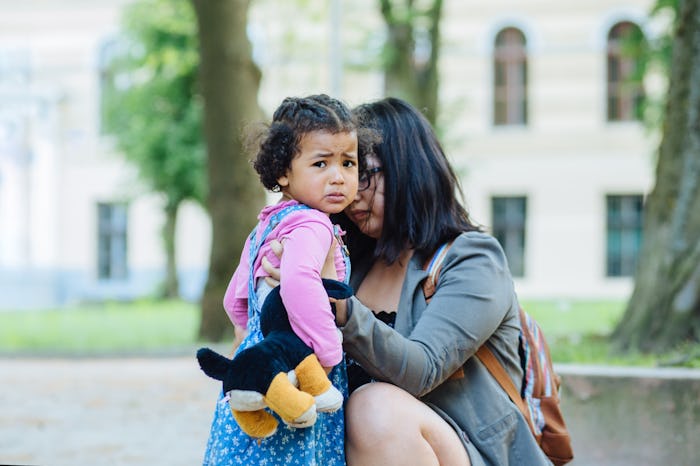Life

When You Freak Out After They Fall, Here's What Your Toddler's Brain Tells Them
When a little one takes a tumble, it can be very hard to regulate one’s emotions. I know my own default reaction when seeing my toddler fall down was to drop to my knees like the shower scream from Psycho. It's just hard, because when your kid wipes out, it really is like you yourself have just sprawled across the ground, such is the visceral panic that grips you.
But before screeching at the heavens in anguish, it can be helpful to stop and think about what your wee one makes of your high dramz reaction. What exactly goes through a toddler’s head when they see their parents freak out after they fall? Especially if they aren't really even that hurt? Are they even aware we're freaking out because they fell, or are they trying to puzzle out what catastrophic thing could incite such a panicked reaction in Mommy? Was her iPhone snatched by vultures? Did the wine store explode? Did Netflix fall into the sea?
I reached out to Dr. Tovah Klein for some insights on the matter. Dr. Klein is the Director of the Barnard College Center for Toddler Development and author of How Toddlers Thrive: What Parents Can Do Today for Children Ages 2-5 to Plant the Seeds of Lifelong Success.
"When a parent gets very upset, or overreacts — often out of parent's own fear or anxiety — the child feels that too, and can get more upset," says Dr. Klein. "The parent is the one who helps the child regulate their emotions. So if the adult's reaction is high, the toddler brain registers more anxiety or negative emotion, rather than a message of comfort and care.”
And probably most parents have witnessed this firsthand: where your kid falls, then searches your face for clues on exactly how loud their wail should be. Is Daddy's brow merely furrowed in mild concern, or is he sprinting toward me like I'm about to be sucked into an alien spacecraft? Does this skinned knee call for a mere quivering of my bottom lip, or should I really get a full breath here so I can make sure they hear me in Queens?
Klein says the most important thing — regardless of your kids' personal reaction — is let them know you are there for them. "If a child falls down and gets hurt, the child needs comfort. Comfort gives them the message that when hurt — and even a small fall can feel like an insult to a toddler — they will be cared for; they are not alone. Depending on the circumstance, that can be a hug, a little rub on the knee if they aren't really hurt, or a band-aid. The child feels cared for, which is important at these ages because these moments give the child a feeling of security: 'I am OK, I am taken care of, my parent is here for me.' Toddlers take that security into being able to explore the world, knowing that they will be cared for when something does not feel right or good."
So, while it may be difficult because your heart is racing and you are fighting the urge to body slam that child who pushed your kid off the seesaw, the best thing moms and dads can do is to try and stay calm, and then feel out what level of soothing their child really needs in that moment. Says Klein: "To provide comfort is to size up the situation and respond accordingly. Does my child simply need me to help them up and let them know I am there, or do they need some extra comfort before they can move on? Either way, the response is a supportive one."
Helpful side note: ice cream appears to have unique healing properties post-wipe-out. While the science behind the medical effects of soft-serve are not well documented, my personal field research has shown that owies magically seem to be forgotten when a swirl cone is carefully applied to the child's tongue. But be sure to use this technique sparingly, lest your child take to throwing himself off the slide in the hopes of a Fudgsicle.
This article was originally published on